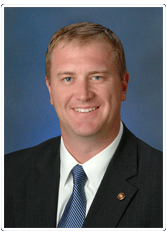ST. LOUIS - Legislation sponsored by Sen. Eric Schmitt, R-Glendale, to help end abusive traffic ticket schemes is now the law in Missouri. Today the governor signed Senate Bill 5, a bipartisan bill designed to reform local government and repair damaged relationships between law enforcement and citizens in areas such as Ferguson.
Sen. Schmitt’s legislation, Senate Bill 5, was passed with overwhelming bipartisan support by the legislature in May. Under current law, municipalities may fund up to 30 percent of their budgets with traffic fines. The Schmitt reform reduces that number to 12.5 percent in St. Louis County municipalities and 20 percent in other areas of the state.
“We must rein in the ongoing practice of municipalities - especially in the St. Louis area - of drumming up local revenue through a rigged system of excessive traffic tickets, which is extracting more each year from the citizens these local governments are supposed to serve,” said Sen. Schmitt. “Government should exist to serve its citizens, not to extort them. Passing this bill is a big step toward ending government by speed trap and taxation by citation.”
In addition to a reduction in how much of a municipality’s budget may come from traffic fines, the bill also requires all St. Louis County municipalities to meet minimum standards, including a balanced annual budget, police department accreditation, access to a complete set of ordinances and other measures to reform local government.
The bill also includes procedures for municipalities to follow when reporting their percentage of revenue from traffic tickets.
“A very important part of this bill is the clarity it provides for municipalities and for drivers,” Schmitt said. “By including a concise definition of revenue, municipalities will know exactly how their budgets may be funded.”
The bill also requires municipal courts to maintain certain procedures, with the main goal being to eliminate debtors’ prisons and to give residents a sense of accountability from their courts. Municipal courts would be prohibited from placing someone in jail because he or she could not pay for a broken taillight or expired tags. Courts will also be required to offer alternative payment plans and community service options to accommodate individuals who cannot pay their entire fine all at once.
Further, under the legislation, municipalities that do not remit excess revenue collected from traffic tickets to the county schools will face a disincorporation question on the next general election ballot. Residents of the municipality violating the law would be given the final say as to whether or not the city should continue its existence.
“This legislation is the product of input, recommendations and experiences from various sources - citizens, law enforcement, judges and legislators - coming together for a common goal - to make local government more accountable to the residents it serves,” Schmitt continued. “Senate Bill 5 goes a long way to restore residents’ trust in their local government. The work continues, but this is a great start.”
Senate Bill 5 was passed in the Senate by a vote of 31-3, and in the House by a vote of 134-25. |



